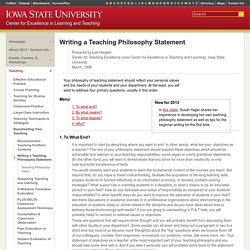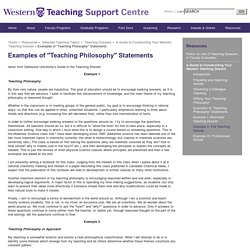

Writing a Teaching Philosophy Statement. Prepared by Lee Haugen Center for Teaching Excellence (now Center for Excellence in Teaching and Learning), Iowa State UniversityMarch, 1998 Your philosophy of teaching statement should reflect your personal values and the needs of your students and your department.

At the least, you will want to address four primary questions, usually in this order. New for 2013 In this video, Susan Yager shares her experience in developing her own teaching philosophy statement as well as tips for the beginner writing for the first time. Menu 1. 1. It is important to start by describing where you want to end. Top 2. When you have a clear idea about your teaching objectives, you can discuss methods that you use to achieve or work toward those objectives. 3.
You will need to discuss how you intend to measure your effectiveness vis a vis the objectives and methods you have outlined. 4. Here is where you can be, if not grandiose, at least a bit grand. Examples of "Teaching Philosophy" Statements. Taken from Dalhousie University's Guide to the Teaching Dossier Example 1 Teaching Philosophy By their very nature, people are inquisitive.

The goal of education should be to encourage seeking answers, as it is in this way that we advance. I seek to facilitate this advancement of knowledge, and the main theme of my teaching philosophy is reasoned thought. Whether in the classroom or in meeting groups of the general public, my goal is to encourage thinking in rational ways, so that this can be applied in other, unfamiliar situations. In order to further encourage seeking answers to the questions around us, I try to encourage the questions themselves. I am presently writing a textbook for this class. Another important element of my teaching philosophy is encouraging reasoned written and oral work, especially in developing logical arguments. Finally, I aim to encourage a sense of wonderment in the world around us.
Example 2. Writing Your "Teaching Philosophy" Constructing this half page can be the most difficult part of putting together a teaching dossier.

Although no general prescription can be given for its construction, we reproduce below the advice iven in several Canadian guides for dossier construction, and follow it with some examples written by various faculty members across the country. (Note that some of these examples are more lengthy than that suggested in the UWO dossier guidelines.) See also the sample dossiers suggested. Dalhousie's Guide to the Teaching Dossier suggests that in the statement "you will reflect upon such questions as what you intend to accomplish through your various teaching activities (both short-term and long-term teaching goals), why you consider these goals to be important, and how your teaching practices promote student learning. " Example II: Full Teaching Dossier.
Teaching Dossier (1996) of COLIN BAIRD, UWO Department of Chemistry Teaching Responsibilities Courses Taught in Last 7 Years Environmental Science 300F/G "Environmental Problems" 1992-93 1 section, first term1993-94 1 section, first term1994-95 1 section, first and second terms1995-96 2 sections, first term Co-taught and co-coordinated the course (with C.

Environmental Science 350a/b "Interdisciplinary Approaches to Environmental Problems" 1993-94, 94-95, 95-96 1 section each year Prepared and delivered the bulk of lectures, and coordinated guest lecturers. Chemistry 226a/b "Environmental Chemistry" 1990-91, 91-92, 92-93, 93-94 1 section each year Prepared and delivered the lectures. Ms. Megan Carnaghi - Professional Teaching Portfolio - Home. How to Write a Statement of Teaching Philosophy - Manage Your Career. By Gabriela Montell You've polished your CV and cover letter and lined up your letters of recommendation.

Your application for a faculty position is ready, with one big exception: You're still struggling to write a statement of your teaching philosophy. The task is daunting -- even for the most experienced Ph.D.'s -- but it's increasingly difficult to avoid, as a growing number of departments are requiring applicants to submit such statements in their job applications. We talked to dozens of professors and administrators to learn what they look for when they read a statement of teaching philosophy, and we assembled their advice on getting started and avoiding some costly mistakes.
Getting Started "Do I even have a teaching philosophy? " Of course you do, says Matt Kaplan, associate director of the Center for Research on Learning and Teaching at the University of Michigan. "Breaking down that broad question into component parts -- for example, What do you believe about teaching?